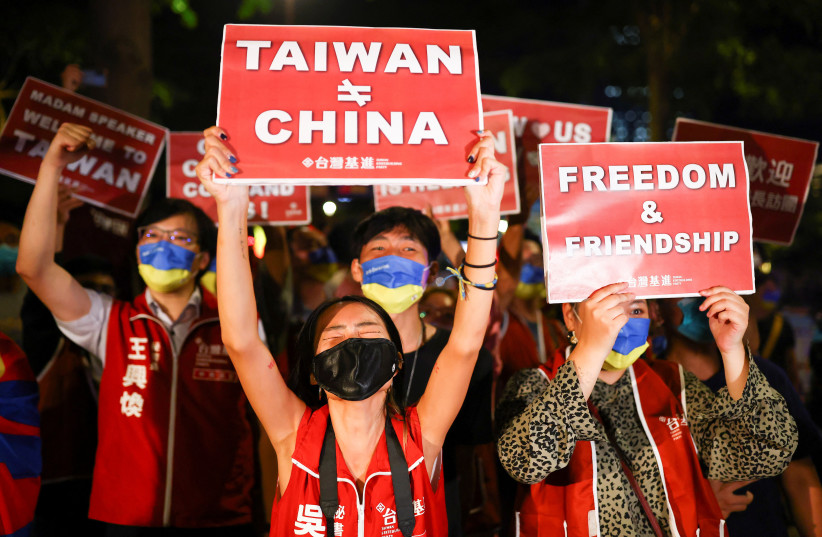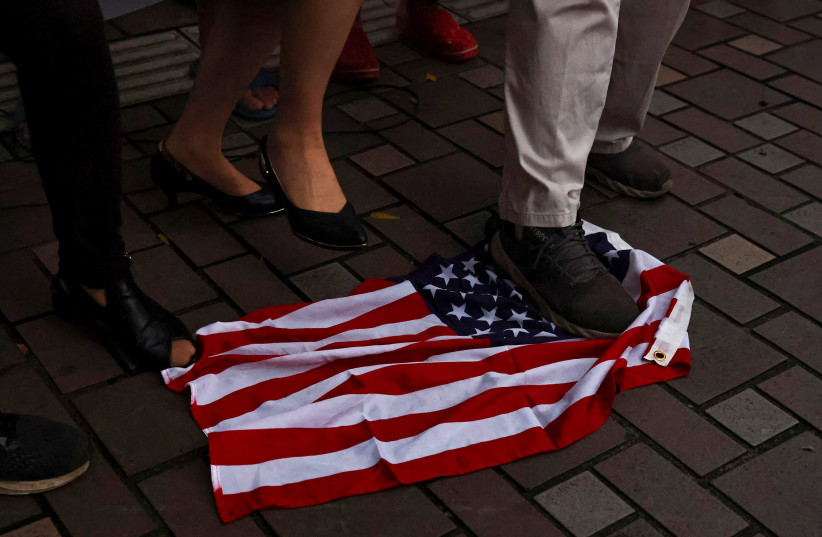After weeks of uncertainty as to whether or not the trip would happen, US Speaker of the House Nancy Pelosi visited Taiwan, landing late Tuesday night.
China's warnings and Western concerns
China had appeared to warn of major consequences if the trip occurred, with talk of Beijing not sitting “idly by” and of “serious consequences.” China’s Foreign Ministry spokesperson said that Beijing was "fully prepared for any eventuality,” adding that “The People’s Liberation Army [PLA] will never sit by idly. China will take strong and resolute measures to safeguard its sovereignty and territorial integrity.”
Meanwhile, the usual suspects on the far Left and far Right in the West were mobilized to sabotage the trip, among them some think tanks and “realist” commentators. Articles appeared warning of a new “crisis” and “escalation.”
“China has responded to Pelosi's trip with a series of ‘live-fire’ exercises near Taiwan," the Responsible Statecraft think tank in Washington said in a published piece. "As the crisis grows, experts aren't convinced by the speaker's argument that her trip is in line with prior American policy.”
Pelosi's message: US stands with Taiwan
Pelosi was on message about the visit, saying: “Our visit reiterates that America stands with Taiwan: a robust, vibrant democracy and our important partner in the Indo-Pacific."

"By traveling to Taiwan, we honor our commitment to democracy: reaffirming that the freedoms of Taiwan – and all democracies – must be respected,” she wrote.
She also wrote about why she was leading a congressional delegation, saying “our delegation’s visit to Taiwan honors America’s unwavering commitment to supporting Taiwan’s vibrant Democracy…Our discussions with Taiwan leadership reaffirm our support for our partner and promote our shared interests, including advancing a free and open Indo-Pacific region.”
This statement from Pelosi was about upholding the status quo and also traditional American values. The US has backed democracies for more than 100 years, demanded things like freedom of navigation and has not backed down from threats and bullying.
"By traveling to Taiwan, we honor our commitment to democracy: reaffirming that the freedoms of Taiwan – and all democracies – must be respected."
Nancy Pelosi
China's tensions with US and redline on Taiwan
The White House sought to downplay the potential crisis brewing between Taiwan, China and the US. However, it was clear that China and pro-China commentators wanted to make it seem like “something” might happen, ranging from concerns over military action to claims that Pelosi's flight could be targeted.
In the end, China sought to draw a redline and the US showed that it would continue to visit Taiwan, which is important. However, Beijing has certainly been watching the US commitment to Ukraine and has seen that Washington's commitment has both an upside and a downside. While there might be visits and military aid, America is reluctant to use its own forces. There may be rhetoric, but the US prefers spending money to fighting on the frontline.
Beijing can also watch closely to see how some US commentators view the trip. It is no secret that there is the usual cacophony of shouting on the far Left about how America is “provoking” and how America is bad for doing things like backing democracy.
But there is also a chorus of voices on the far Right and among some other analysts who are saying that the US has no interest in Taiwan. This means that China can always count on the next American elections to bring some voices to power who oppose the US support for Taiwan.

Beijing can also continue to chip away at Western support by doing what it has been doing in recent years: confronting Western military patrols in the Pacific by harassing aircraft or ships. And it can continue to build up forces on disputed atolls and reefs in the South China Sea.
Showing up is the most important part
The overall point of Pelosi’s trip is that she went. It doesn’t necessarily matter what got done or what she said, but that once there was talk of a “military response” and “redline,” the US had to show that its historic commitment to Asia, and Taiwan in particular, would continue. This is no minor thing.
The US has played a role in the Pacific for over 150 years. Back in 1853, American Commodore Matthew Perry led four ships into the harbor at Tokyo Bay in Japan. US missionaries, whale boats and traders played a key role in the Pacific, culminating in the role of men like John Birch, who one publication called a “fighting missionary.”
After 1945, key US figures like Gen. Douglas MacArthur played a role in shaping America's commitment to Japan, South Korea, Taiwan and the Philippines. This was no small endeavor. Leaders from the region were educated in the US and influenced by American cultural exports, and the post-war economic boom was tied to the US.
It’s easy to think of America's role in Europe as one that is important, but in reality, it is its role in Asia that was paramount for a century – and it is only an accident of history that some of this is forgotten.
US-China relations have also ebbed and flowed over the years, from the era of the Korean War to Richard Nixon’s famous visit.
What matters today is that the US still decides where Navy ships will sail and where congressional delegations will go. The US Coast Guard helps ships in Oceania through operations like Blue Pacific that patrol economic zones in the area.
As such, Pelosi had to go to Taiwan once news of the potential trip became public and Beijing began a campaign that appeared aimed at preventing it. Her trip matters for the fact it took place.
The US has to decide who will draw the redlines. Will America have policies dictated to it, or will it continue the status quo of being in charge? Countries are watching, from South Korea to Japan, Australia and India. Smaller countries, that want to know if the US is committed, are also watching.
They have watched the US walk away from places like Afghanistan and they wonder whether US power is declining or if America is really positioning itself for what is called “near-peer” rivalry; a real rivalry with China in Asia in which the US will need to back its partners and allies. They also read the new isolationist agendas appearing in American media and know that in the future, Washington might have a president who is more circumspect about US power.
